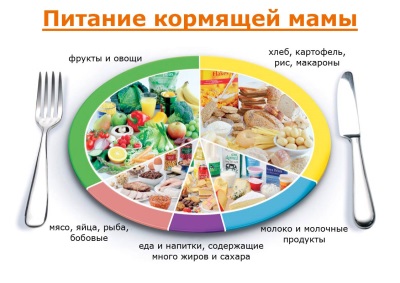Food nursing mom
As soon as the crumb was born, many questions arise about his diet in front of his mother. The main ones are whether it is necessary to follow a diet, what foods should not be consumed, as well as what to eat about the first time after the birth of the baby?
The importance of dieting
Mom, who monitors their diet after childbirth:
- It will be able to provide both the body and the baby's body with nutrients that are necessary for health.
- It can prevent the appearance of constipation, colic, diarrhea, allergies.
- It will not worsen the taste of milk, so the baby will not give up the breast.
General recommendations for a nursing mother
- The daily caloric content of a woman who breastfeeds, usually increases by 500-600 kcal, which are spent on milk production.
- Nutrition is best done fractional, eating food per day 5-6 times in small portions. Mom should not go hungry, but overeat is also not recommended. Go on a diet in the first months of lactation should not be.
- Experiments with products can be started from the second month after delivery.
- It is necessary to start keeping a diary in which mommy will mark all the foods eaten during the day, as well as the reaction of the baby to them.
- If the introduction of a product into the mother's diet caused a thinning of the stool, rash, bloating and other symptoms in the baby, it should be excluded from the woman’s diet for a while.
- Food for snacking should always be easy to access, since the first months babies are often attached to their breasts and suck for a long time.
- The amount of fluid that a mother drinks per day should be sufficient for a particular woman. With increased thirst, you can drink more, and if there is no thirst, you should not drink water or tea through force.
Need table
All women who carried the child and are preparing to breastfeed him heard that it was important to have a balanced and well-balanced diet after birth. Nutrient requirements for nursing moms are higher than for ordinary women.
|
Nutrients |
Requirements per day |
Food |
Estimated number per day |
|
Squirrels |
120-130 g |
Lean meat or fish |
100-200 g |
|
Of which animal proteins |
72 g |
Cheese |
20-40 g |
|
Fat |
100-110 g |
Low-fat cottage cheese |
100-150 g |
|
Of these, vegetable fat |
34 g |
Milk |
200-250 ml |
|
Vitamin A |
8250 IU (0.5 mg) |
Kefir or ryazhenka |
200-500 ml |
|
Vitamin C |
120 mg |
Butter |
30-50 g |
|
Vitamin B1 |
3 mg |
Vegetable oil |
25-35 g |
|
Vitamin B2 |
3.5 mg |
Sour cream |
50-100 g |
|
Vitamin B6 |
4 mg |
Wheat bread |
100 g |
|
Vitamin PP |
25 mg |
Rye bread |
100 g |
|
Calcium |
1900 mg |
Other flour products |
150 g |
|
Phosphorus |
3800 mg |
Cereals or pasta |
60 g |
|
Magnesium |
1250 mg |
Vegetables |
500-600 g |
|
Iron |
30 mg |
Berries and fruits |
200-300 g |
First days
Mom's food during this period is the most severe with many restrictions. All products that can cause colic or allergies in an infant are completely excluded.
On the first day of the postpartum period, it is sometimes advised to abstain from food altogether so that the body rests. On the third day after birth, it is advised to restrict the fluid, since during this period a lot of milk often begins to arrive.
Sample menu by month
In the postpartum period in the first three months, the diet of women who feed their babies with breast milk has its own characteristics. Consider separately each month after delivery.
The first
During this period, you should limit whole milk (maximum glass per day) and black bread (you can up to 1 piece). Dishes should be cooked, stewed or baked, the use of a slow cooker or steamer is recommended.
For breakfast, my mother is advised to eat porridge on the water (buckwheat, rolled oats, rice) or pour kefir with muesli. In porridge it is worth adding a little butter. Snacks for mom in the first month breastfeeding can be baked apples, natural yogurt without additives, sandwiches with cheese, a glass of kefir. If you want sweet, you need to add sugar to porridge and tea.
At lunch you can cook a vegetarian soup, the ingredients of which will be zucchini, cauliflower, onions, turnips, a small amount of potatoes and carrots. Also a good lunch option would be lean meat (for example, beef) or fish and steamed vegetables.
A good choice of dishes for dinner will be pasta with cheese, vegetable stews, low-fat cottage cheese with sour cream. Drink during the day can be weak tea, compote, boiled from apples or dried fruits. Constipation is a frequent problem of the first month after giving birth, so you can carefully add prunes, beets, bran, and also not canned sea kale into the diet of your mother.
Second
Other cereals are introduced into the diet - barley, pearl barley, wheat. Porridge can now be cooked in low-fat milk. The list of consumed vegetables is expanding - eggplant, pumpkin, pepper, a small amount of white cabbage appear in it.
For lunch, first courses are recommended based on vegetable and meat broths. Of meat dishes, lean beef and pork, rabbit meat, poultry are preferable. Offal should not be consumed. Stewed or baked vegetables will be a good side dish for meat. For fish, you can cook pasta or potatoes. Eggs should be consumed in the amount of 1-2 per week, preferably cooked.
The amount of milk per day can be increased, as well as the amount of black bread. Also, for the second month of feeding, sweet products in a small amount are admissible - cookies, biscuit without cream, jam, jelly, croutons, jams, condensed milk.
Fruits should be consumed only those that are grown in the area where the mother lives. Of the exotic allowed only banana - one per day. Mom can not bake apples, and use them raw. The berries are recommended gooseberry, black currant.
Nuts should not be consumed. Vegetable oil is added to the dishes - sunflower, corn, and olive oil. You can also add fresh greens to food.
Third
This month, the intestinal flora of the baby begins to work better, so the risk of negative reactions to the mother's menu is reduced, which contributes to the expansion of the woman's diet:
- Mom can drink fresh juice from carrots, apples, pumpkins.
- Onions in the third month of lactation can be consumed fresh.
- Having tasted different fruits and fresh vegetables separately, now you can make different salads from them.
- The amount of meat in the diet can be increased.
- Mom can gently add homemade jam and honey to cheesecakes.
- Increasing the amount of whole milk in the diet, as well as white cabbage is not worth it.

Fourth
By this month, severe restrictions in my mother's diet are removed, so a woman can enter into the diet a lot of foods that were prohibited earlier. At the same time, a new product should be added once every three days (preferably in the morning meal), noting the reaction of the infant.
Mom can already afford fried dishes, eat more fruit, sweet dishes.At the same time it is important to remember about moderation.

How foods are not recommended?
- Legumes, as they provoke swelling in the baby and cause colic.
- Vegetables and fruits, which have a red color, as well as citrus fruits. They are dangerous the occurrence of allergic reactions. Also to potential allergens include seafood, nuts and honey.
- Bitter, spicy dishes, as well as spices and spices - they can affect the taste of breast milk, as well as its smell.
- Products with chemical additives - preservatives, artificial colors, flavors and others.
- Exotic fruits, which can be highly allergenic, and grapes that provoke fermentation.
- Products containing alcohol.
- Chocolate, as well as sweet pastries - due to such products fermentation processes in the gastrointestinal tract can intensify.
- Unboiled milk - can cause poisoning.
- Coffee - causes increased excitability.
- Sweet soda can cause bloating.
- Mushrooms are hard to digest and can cause poisoning.
- Smoked products, ready-made sauces and pickled products.
- Chili - can cause burns in the baby's throat.
- Fast food - extra calories and harmful substances for mom's organism.















